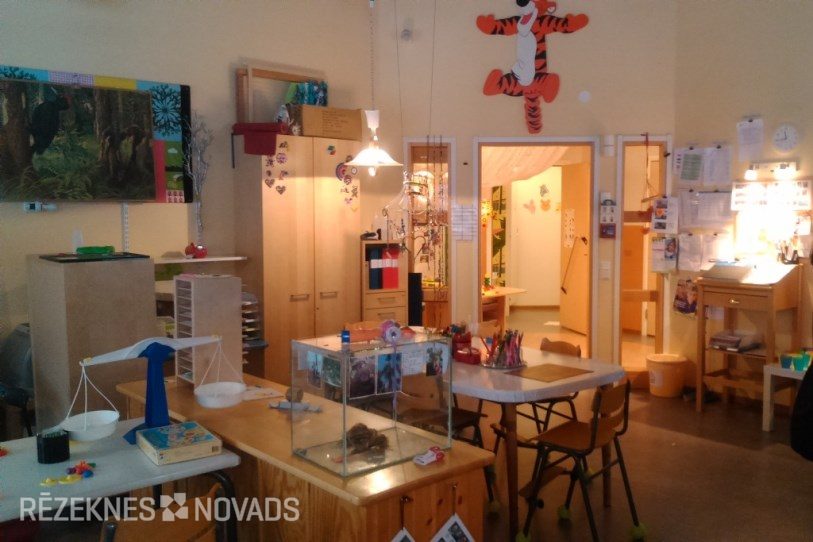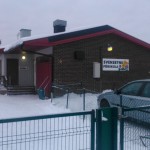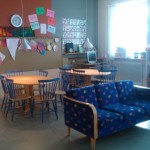Griškānu PII acquainted with cooperation partners in Sweden

At the beginning of February, i visited Griškānu Pre-school Educational Authority (PII) to share the impressions and insights of the teachers of the Nordplus project “Green is Good” at the Swedish city Pitea and Infjarden pre-school education institutions. There are four pre-school educational institutions in the municipality of Pitea, which vary in the number of children, the highest number of children – 120, the lowest – 18.
The educational process in the pre-school educational institutions of the municipality of Pitea is organised very closely at home conditions, so that both children and teachers do not feel unnecessary stress. The work of these educational institutions has been recognised as the highest quality in Sweden. Preventive measures are taken at the pre-school education stage in the field of psychological and emotional security, equality, contact, communication and a safe environment for children in both indoor and PII areas.
Pre-school education is optional in Sweden, but six-year-olds attend preparatory groups in schools. It should be added that whether their apology will be visited by the preparatory team is in parental terms because the option that the child is being prepared in the home environment is respected.
Infjarden pre-school educational institutions are working according to the methods of pedagogy of Regio Emilia, based on the concept of teacher Loris Malaguzzi, a 1970 concept in which nature is called the third pedagogy.
All pre-school groups are provided with information technology devices that are actively used by teachers in children's research works.
We met a teacher who talked about the experience of his group in collaboration with the Icelandic pre-school children in the field of natural research. During active communication, children ask questions and get answers. For several years, the Swedish national setting in the field of pre-school education foresees to raise as many scientists and researchers as possible, so there are many qualitative methodological developments in the nature pedagogy, which will also be possible for our teachers in the course of project implementation. In turn, our co-operation partners in Sweden were interested in the skills of the pre-school educational institutions of Rezekne to preserve the traditions of the People's traditions, festivals and events, as well as co-operation with parents. Our heads of pre-school education institutions can be proud of experience in these areas, so they will be able to make recommendations to Swedish colleagues.
By telling Swedish colleagues about the work of our pre-school educational institutions, we received praise for professionally prepared frames, as every teacher in our country has higher education. However, in Sweden, there is no such requirement for pre-school teachers and the acquisition of higher education is a teacher initiative. I want to ask colleagues about good English skills, because all the teachers and teacher assistants in these days are using this foreign language freely.
Children's walk takes place in any time. At the time when we were in the Pitea, the temperature stayed between -17 and 20 degrees, the children slid from the hills in suitable clothes, roamed down the snow, and went to a nearby library. At a nearby school, the pupils were playing football in the snow and shuffling from snow. Every pre-schoolman is dressed in a reflective vest during a walk.
I am very pleased with the opportunity offered to me for one day to work with Swedish colleagues Elizabeth and Annette in the 2-year-old group of children. I was delighted to see how much emphasis was being placed on the preservation of the physical health of teachers. Each PII teacher's daily work has very handy, functional, ergonomic and easy-to-use chairs that allow you to be mobile during sessions. We have children's tables at the height of the teacher's table, in place of the small children's tables and chairs. The chairs are designed with a step that makes it easier for the child to climb, by developing the ability to keep the balance, climb, disembark, and even small children do it quite masterly.
In pre-school educational institutions, there was an interesting set of room spaces: there are both mathematics rooms, musical and movement rooms, and arts, other parts of the water room, and a room in which children can sleep because the day sleep is not mandatory and the institution with 120 children is only 3 children at the request of parents, at the outdoor conditions in special sleeping bags in places intended for it.
For children's creative activities, the use of second-time materials is very much used to provide children with instructions as to how these materials can be used to construct “structures”.
I had an opportunity to watch a device specially designed for children, “assistant boots”, which makes it easier for children to wear their own clothes and make no unnecessary effort to a teacher. The day spent BY PII allowed it to be seen that in early age, the children had a very high degree of self-sufficiency and self-service skills in both meals and activities and hygiene procedures.
Holidays in institutions are held in children with teachers, without parental participation. Parents are given information about what happened via e-environment.
With the lessons learnt and impressions, i will also introduce other leaders and pre-school teachers of THE Rēzekne municipality to encourage the use of innovative methods in the educational process.
Biruta Rīvāne
Rēzekne District School of Pre-School Education

